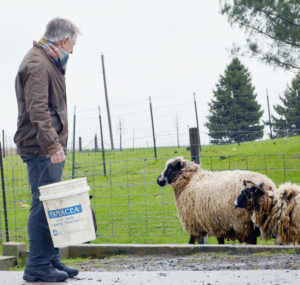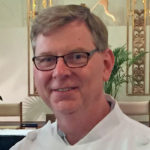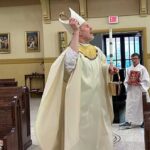By Barb Arland-Fye
The Catholic Messenger
DAVENPORT — Father Bud Grant, a St. Ambrose University professor and environmental ethicist, sounds like a modern-day prophet exhorting people to change their ways for the sake of all of God’s creation. Not because their individual efforts will make a difference, but because it’s the right thing to do.

Father Bud Grant, a professor at St. Ambrose University in Davenport, works on his farm just outside Davenport.
That was the overarching message of a talk he gave Jan. 27 to a book discussion group at the St. Vincent Center, the Davenport Diocese’s headquarters. He’d been asked to give a talk on Laudato Si, (Care of Our Common Home), the much publicized encyclical that Pope Francis wrote. Clearly, it’s a presentation Fr. Grant relishes. He told the book group that by April he will have given 42 presentations in the Upper Midwest on the encyclical, published in June 2015.
He quoted extensively from the pope’s encyclical, which he translated from the original Italian when it was hot off the presses. Media far and wide wanted his impressions ASAP, particularly because Laudato Si deals, in part, with the impact of climate change. “The press wants to politicize this, but the pope isn’t having any of it,” Fr. Grant said. The pope uses the word “creation” 248 times in Laudato Si; he never uses the word “Democrat” or “Republican.”
The pope, however, doesn’t shy away from addressing climate change. He believes it is “real, it’s advanced and it’s anthropogenic (originating in human activity),” Fr. Grant continued. His PowerPoint slides buttressed the pope’s encyclical, which focuses on right relationships between human beings, between human beings and nature, and between human beings and God.
Climate change is one symptom of the relationships being out of whack, Fr. Grant pointed out. The year 2015, for example, was the warmest year recorded. An economy powered by fossil fuels is a major contributing factor. As the temperatures increase, so do cataclysmic weather events, which in turn threaten the earth’s biodiversity, he said. Iowa could become the new Kansas, according to a CNN report, with dryer, hotter summers and shorter, more intense winters. Another example of the skewered relationships: Just 62 people own as much wealth as the 3.5 billion people in the bottom half of the world’s income, according to the New York Times.
Those statistics speak to the fact that the marginalized, the people least equipped to deal with climate change, suffer the greatest from its impact, Fr. Grant said. Pope Francis calls for redistributive suffering on behalf of the marginalized, future generations and creation itself.
“We should shift the yoke of suffering from those victims onto our own shoulders,” Fr. Grant said, referring to Paragraph 167 in Laudato Si. He offered simple, but challenging suggestions about what that “suffering” looks like. Consume less; be willing to pay more for organically grown food if you can afford it; be more aware of your consumption patterns; simplify your diet; think about purchasing second-hand clothing. Elect people who believe there’s a problem and have the courage to do something about it.
You don’t have to give up eating meat, he told the audience, but limit your consumption. Does he eat meat? Yes, but mostly for special occasions, when it’s served to him in someone’s home, or when he’s pouting, he joked.
John Valenti, diocesan coordinator for Lifelong Faith and Lay Ministry Formation, appreciated Fr. Grant’s insights. “It’s a once in a lifetime phenomenon that the area he’s working in theologically happens to come to the forefront with a big push by the pope,” Valenti said. Fr. Grant “lives what he preaches. He raises sheep and chickens. He lives very ‘green’ and in that sense he inspired me.”
The talk also impacted Valenti spiritually. “The only solution is not just to give prayerful consideration for those who are less fortunate, but to actually take on their burden … it’s about putting ourselves in poverty with those who suffer.”
Diocesan volunteer Loxi Hopkins said Fr. Grant “puts theology and reality together in a way that’s understandable. He gives you lots to think about. He’s made me more aware. I thought to myself this morning as I left the house, ‘Are all the lights off upstairs?’”
To see Fr. Grant’s full presentation, watch the video below (recorded by Tony Forlini)











